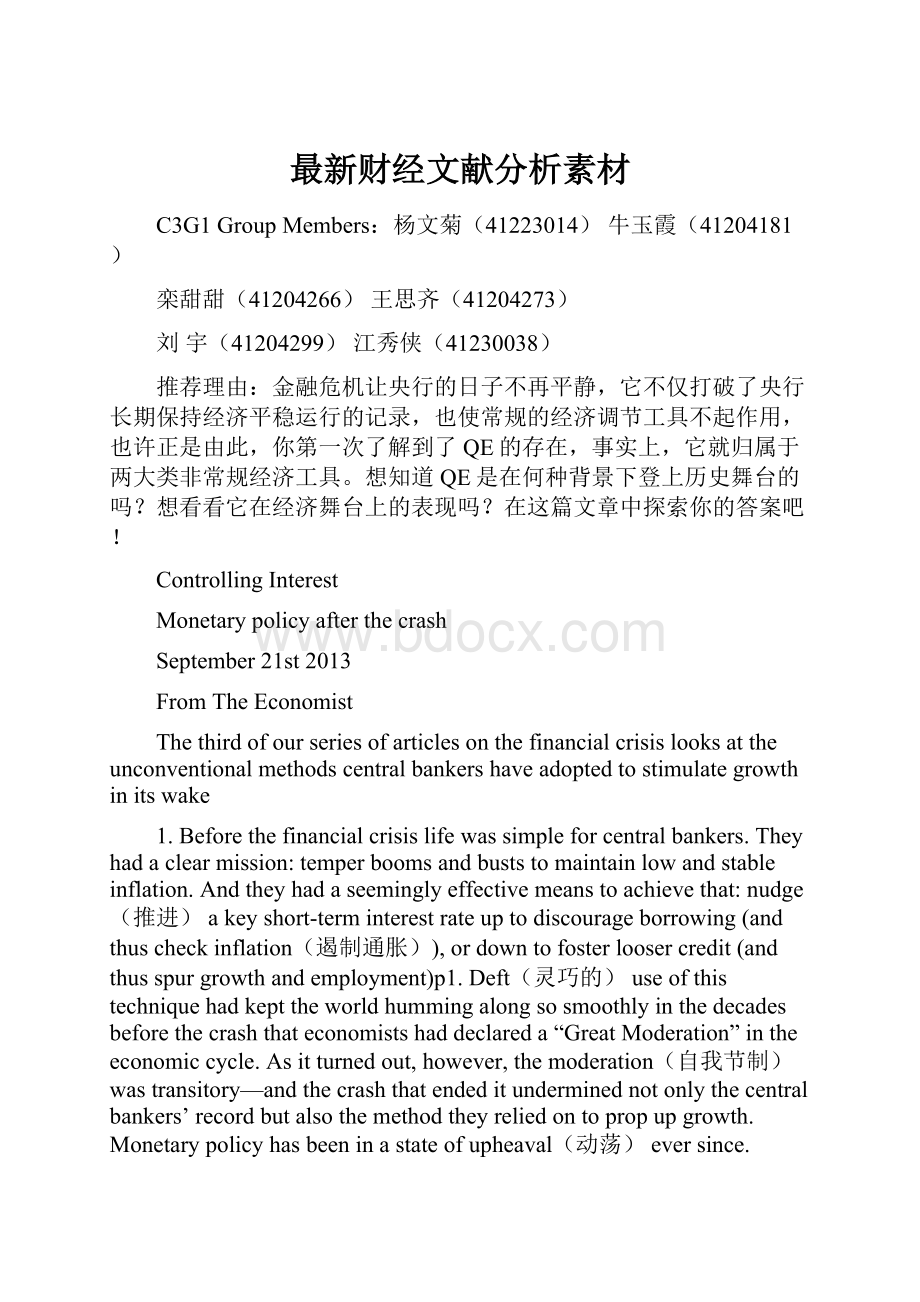最新财经文献分析素材.docx
《最新财经文献分析素材.docx》由会员分享,可在线阅读,更多相关《最新财经文献分析素材.docx(7页珍藏版)》请在冰豆网上搜索。

最新财经文献分析素材
C3G1GroupMembers:
杨文菊(41223014)牛玉霞(41204181)
栾甜甜(41204266)王思齐(41204273)
刘宇(41204299)江秀侠(41230038)
推荐理由:
金融危机让央行的日子不再平静,它不仅打破了央行长期保持经济平稳运行的记录,也使常规的经济调节工具不起作用,也许正是由此,你第一次了解到了QE的存在,事实上,它就归属于两大类非常规经济工具。
想知道QE是在何种背景下登上历史舞台的吗?
想看看它在经济舞台上的表现吗?
在这篇文章中探索你的答案吧!
ControllingInterest
Monetarypolicyafterthecrash
September21st2013
FromTheEconomist
Thethirdofourseriesofarticlesonthefinancialcrisislooksattheunconventionalmethodscentralbankershaveadoptedtostimulategrowthinitswake
1.Beforethefinancialcrisislifewassimpleforcentralbankers.Theyhadaclearmission:
temperboomsandbuststomaintainlowandstableinflation.Andtheyhadaseeminglyeffectivemeanstoachievethat:
nudge(推进)akeyshort-terminterestrateuptodiscourageborrowing(andthuscheckinflation(遏制通胀)),ordowntofosterloosercredit(andthusspurgrowthandemployment)p1.Deft(灵巧的)useofthistechniquehadkepttheworldhummingalongsosmoothlyinthedecadesbeforethecrashthateconomistshaddeclareda“GreatModeration”intheeconomiccycle.Asitturnedout,however,themoderation(自我节制)wastransitory—andthecrashthatendeditunderminednotonlythecentralbankers’recordbutalsothemethodtheyreliedontopropupgrowth.Monetarypolicyhasbeeninastateofupheaval(动荡)eversince.
2.Therecession(经济衰退)thataccompaniedthecreditcrunchintheautumnof2008deliveredamassiveblowtodemand.Inresponsecentralbanksintherichworldslashedtheirbenchmarkinterestrates.Byearly2009manywereclosetozero,approachingwhateconomistscallthe“zerolowerbound”.Evenso,growthremainedelusive.Pushingratesbelowzero,thoughtechnicallypossible,wouldnothavehelped.Negativerateswouldmerelyhaveencourageddepositorstowithdrawtheirmoneyfrombanksandholditascash,onwhichtherateofreturn,atzero,wouldhavebeenhigher.Centralbanksinthedevelopedeconomiesfacedafrighteningcollapse(崩溃)inoutputandsoaringunemploymentwithoutrecoursetothetoolthathadbeenthemainstayofmonetarypolicy-makingforageneration.
3.Centralbankswerenotentirelyunpreparedforthischallenge.Inthe1990stheJapaneseeconomyhadslumped(暴跌)followinganasset-pricecrash.FacingweakgrowthanddeflationtheBankofJapanhadslashedratestonear-zerobeforeembarkingonaseriesofexperimentswithunconventionalmonetarytools.AlthoughtheBankofJapan’sperformancewaswidelyconsidereddisappointing,ifnotanoutrightfailure,therichworld’scentralbanksbeganbydrawinguponitsplaybook.
4.Unconventionalpolicyfallsintotwobroadcategories:
assetpurchasesand“forwardguidance”.Assetpurchasesareanaturalextensionofcentralbanks’moretypicalactivities.America’sFederalReserve,forinstance,haslongboughtTreasurybillsandotherbondswithshortmaturitiestoincreasethemoneysupplyandreduceshort-terminterestrates.AfteritsbenchmarkratefellclosetozerotheFedbeganbuyinglonger-termsecurities,includingten-yearTreasurybondsandmortgage-backedsecurities,tobringdownlong-runborrowingcosts(seechart1).
5.Printingmoneytobuyassetsisknownas“quantitativeeasing”(QE)becausecentralbanksoftenannouncepurchaseplansintermsofadesiredincreaseinthequantityofbankreserves.TheBankofJapanfirstattemptedQEin2001whenitpromisedtobuy{Yen(日元)}400billion-worthofgovernmentbondsamonthinordertoraisethelevelofreservesto{Yen}5trillion(万亿).ThecentralbanksofAmerica,BritainandJapanhaveallengagedinQEsincethecrisisstruck,buyingupavaststockoffinancialassets(seechart2).
6.Economistsreckon(评定)QEworksinafewways.Centralbankersemphasisethe“portfolio-balanceeffect”.Whenacentralbankbuysbondsfrominvestorswithnewlycreatedmoney,theyusetheproceedstorebalancetheirportfolio(总资产)bybuyingassetsofdifferentriskandmaturity.Indoingsotheyboostassetpricesanddepressinterestrates(increaseddemandforbondsallowsthemtobesoldatlowerrates).Cheaperborrowing,inturn,prodsbusinessesandhouseholdstoinvest.
7.QEcanstimulate(刺激)theeconomyvia(通过,经由)afiscaleffect,too:
lowerinterestratesreducegovernmentborrowingcostsandsolowerexpectedfuturetaxation.AndQEalsohelpsshapeexpectationsofinflation.Acentralbankannouncinganew,higherinflationtargetmightuseQEtoconvincemarketsitwillmeetit,since,otherthingsbeingequal,anincreaseintheamountofmoneyincirculationleadstohigherprices.Ifpeoplethinktheirmoneywillbeworthlessinthefuture,theyhaveanincentive(动机,刺激)tospendmoreofitnow.
Talkingprop
8.Forwardguidance,theothermainunconventionaltool,isanattempttoboosttheeconomybysignalling(发信号)centralbanks’futurepoliciesmoreclearly.TheBankofJapanfirstattemptedtotalktheeconomybacktohealthin1999,whenitpromisedtokeepitsmaininterestratenearzero“untildeflationaryconcernssubside(消退)”.TheFedandtheBankofEnglandhavesincemimicked(模仿)thisapproach.Inearly2009theFedsaiditsinterestratewaslikelytoremainlowfor“anextendedperiod”.InAugust2011itsoughttoimprovethisformulation(构想)byaddingadate,specifying(说明)thatlowrateswouldstickaround(逗留)untilatleastmid-2013.
9.InDecember2012theFedadjusteditscommunicationsagain.Itannouncedthatrateswouldstaylowuntiltheunemploymentratehadfallentoatleast6.5%,aslongasshort-runexpectationsofinflationwerenomorethan2.5%.InAugust2013theBankofEnglandfollowedsuit,statingthatitwouldnotraiseratesuntilunemploymenthadfallento7%,provided(假如)financialmarketsbehavedthemselvesandinflationremainedsubdued(被抑制的).
10.LikeQE,forwardguidanceworksinseveralways.Apromisetotoleratehigherinflationinthefuture,ifbelieved,canstimulate(刺激)economicactivityinthepresent,justasthethreatofhigherpricesduetoanexpandedmoneysupplydoes.Bythesametoken(表征),apromisetoholdshort-termrateslowforalongtimeshouldreducelong-termratestoo,sincelong-termratesaretypicallycompounded(复合的)short-termratesalongwithapremium(溢价)toallowforrisinginflationandotherrisksp2.
11.Inaddition,investorsrespondtothe“real”orinflation-adjustedinterestrate,whichequalsthe“nominal”oradvertisedinterestrateminusexpectedinflation.Wheninflationisexpectedtobenegative,meaningthatpricesarefalling,therealinterestratemayactuallyrise.Deflation,byraisingthevalueofaunitofmoneyintermsofothergoods,ineffectincreasesthecostofborrowing.Ifacentralbankcrediblypromisesmorefutureinflation,bycontrast,therealinterestratecanfallandevendipbelowzero.Anegativerealinterestrateworkswhereanegativenominalinterestratedoesnot:
holdingcashdoesnogood,sinceinflationreducesthepurchasingpowerofhardcurrencyaswellasdeposits.Itisthereforeineveryone’sinteresttosaveless,andtoborrowandinvestmore.
Fromtheorytopractice
12.Studiesofquantitativeeasinggenerallyfindthatithasindeedreducedlong-terminterestrates.Oneruleofthumb(经验法则)hasitthat$600billioninpurchasesbringsdownlong-runratesby0.15-0.2percentagepoints,equivalentin(等价于)impacttoacutof0.75percentagepointsintheFed’sbenchmarkshort-terminterestrate.LowerratesareestimatedtohaveraisedrealoutputinBritainandAmerica2-3%higherthanitwouldhavebeenwithoutQE,eventhoughborrowingcostsremainedstubbornlyhighforBritishbanks.
13.RecentresearchalsosuggeststhatQEplaysastrongroleinreinforcingacentralbank’sforwardguidance.TheFed’ssignalling,forexample,seemstoberesponsibleformuchofthemovementinthepricesevenofassetsitisnotbuyingitself.p3Andmarketbetsonfutureinterestratesrevealthatinvestorsfindcentralbanks’promisestokeeprateslowmorecrediblewhenaccompaniedbyQEpurchases.
14.Whetherforwardguidanceiseffectiveatboostingoutputishardertosay.Thereissomeagreementthatcommunicationaboutfuturepolicyreduceslong-terminterestrates.Butitisunclearwhyratesfall.Theycoulddropbecausemarketsbelievethecentralbank’spromisetokeepshort-termrateslow,whichshouldencouragemoreinvestmentandgrowth.Buttheycoulddropbecausemarketsreadthecentralbank’sguidanceasasignalthattheeconomyisweakerthanexpected,implyinglessdemandforloans.Thatcouldactuallyprovecounterproductive(适得其反)ifitdiscouragednewinvestment.
15.SomerecentFedresearchsuggeststhefirsteffect—thecredibility(可信性)ofthepromise—ismoreimportant.Otherworkindicatesthatguidancemaybemorepowerfulwhenitclearlyrepresentsa“commitment”toaparticularpolicyratherthana“forecast”offutureeconomicconditionsandthepolicythatislikelytoflowfrom(来自)them.
16.Whatiscertainisthatforalltheexperimentation,therichworld’sbigeconomiesarestillstruggling.OutputinBritainremainsbelowitspre-crisis(危机前)peak.Some10mfewerAmericansarenowworkingthanmightreasonablyhavebeenexpectedin2007.Theeuroarea(欧元区)isonlyjustescapingthesecondtroughofadouble-diprecession,anditsunemploymentrateremainsindoubledigits.Unconventionalmonetarypolicy,inshort,doesnotseemtobeworkingaswellastheconventionalsortusedto—butthereisnoagreementwhy.
17.Someeconomistsmaintainthatmonetarypolicy,conventionalorotherwise,losesmuchofitspoweratthezerolowerbound.SimonWren-LewisofOxfordUniversityarguesthatmonetarypolicycannotstabilisetheeconomywithoutfiscaleasing,meaningmoregovernmentspendingorlowertaxes,totransmitnewlycreatedmoneyandlowratesintotherealecon